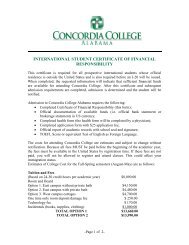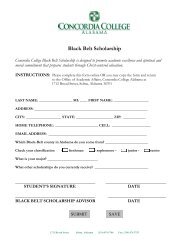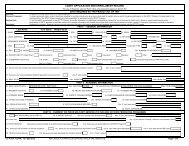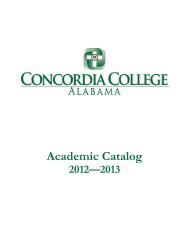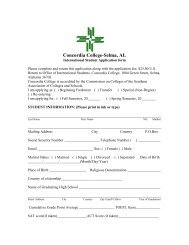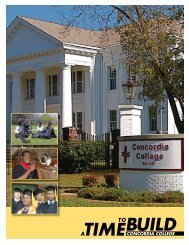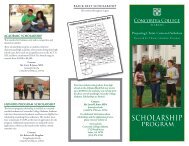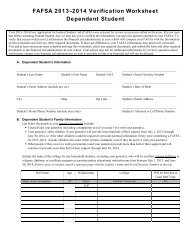International Student Handbook - Concordia College
International Student Handbook - Concordia College
International Student Handbook - Concordia College
Create successful ePaper yourself
Turn your PDF publications into a flip-book with our unique Google optimized e-Paper software.
Internati·nal<strong>Student</strong> Handb··k“For I know the plans I have for you,” says the Lord.“They are plans for good and not for disaster,to give you a future and a hope.”Jeremiah 29:11
<strong>International</strong> STudents<strong>International</strong> STudentsDefiniti·n<strong>International</strong> students can primarily be defined as those who stay at CC-S on F–1 visastatus. CC-S students who were born outside of the U. S. but hold permanent residencestatus can be categorized as international students. Other students can be members ofthe <strong>International</strong> <strong>Student</strong>s Association, yet they can not be categorized as internationalstudents.23
<strong>International</strong> STudents<strong>International</strong> STudentsInternati·nal <strong>Student</strong>smissi·nThe <strong>International</strong> <strong>Student</strong>s Office is devoted to the unique personal and educationalgoals and needs of the diverse international community at the college.Since this office deals with multicultural and immigration issues, the mission can beaccomplished in the following distinctive ways:® Educating the international and local college community about state and federalimmigration regulations affecting foreign students and acting as a resource forinternational students.® Serving as the CC-S Principle Designated School Official (PDSO) or Designated SchoolOfficial (DSO) for F–1 students.® Advising students on how to secure visas, maintain immigration status, and secure thebenefits of that status.® Managing <strong>Student</strong> and Exchange Visitor Information System (SEVIS) compliance.® Creating an environment of acceptance, openness, curiosity, and knowledge to inspirethe CC-S community to explore new cultures and experiences.® Planning and coordinating various international student activities and programs at thecollege through the <strong>International</strong> <strong>Student</strong> Association (ISA).® By working with campus groups such as honors club, spiritual life, SGA, athletics andstudent activities, ISA advocates for the distinct issues international students face intheir transition to life at CC-S and the United States.4 5
<strong>International</strong> STudents<strong>International</strong> STudentsAnnual C·sts andSch·larshipsAnnual CostsMandatory ChargesTuition (based on 24–30 credit hours per academic year) ..... $8,090.00Room and BoardOption 1. East campus without private bath . . . . . . . . . . . . . . . . $4,150.00Option 2. East campus with private bath . . . . . . . . . . . . . . . . . . . $4,480.00Option 3. West campus cottages .......................... $4,700.00One-time only room deposit/damage fee................... $250.00Technology fee . . . . . . . . . . . . . . . . . . . . . . . . . . . . . . . . . . . . . . . . $170.00Incidentals (books, supplies, clothing)..................... $1,000.00TOTAL Option 1 . . . . . . . . . . . . . . . . . . . . . . . . . . . . . . . . . .$13,660.00TOTAL Option 2 . . . . . . . . . . . . . . . . . . . . . . . . . . . . . . . . . .$13,990.00TOTAL Option 3 . . . . . . . . . . . . . . . . . . . . . . . . . . . . . . . . . .$14,210.00Non-Mandatory ChargesApplication fee . . . . . . . . . . . . . . . . . . . . . . . . . . . . . . . . . . . . . . . . . $25.00Audit fee ...............................................$110.00 per CourseGraduation feeAssociate . . . . . . . . . . . . . . . . . . . . . . . . . . . . . . . . . . . . . . . . . $100.00Baccalaureate . . . . . . . . . . . . . . . . . . . . . . . . . . . . . . . . . . . . . $125.00ID card replacement . . . . . . . . . . . . . . . . . . . . . . . . . . . . . . . . . . . . . . .$25.00Key replacement .. . . . . . . . . . . . . . . . . . . . . . . . . . . . . . . . . . . . . . . $25.00Late registration fee . . . . . . . . . . . . . . . . . . . . . . . . . . . . . . . . . . . . . . .$50.00Professional semester fee .................................$150.00Transcript fee (regular) ................................... $10.00Transcript fee (express)................................... $30.00Vehicle registration fee ....................................$50.00ScholarshipsFor hardworking, talented students, CC-S offers various academic, athletic, and musicscholarships such as presidential, honors, basketball, football, soccer, volleyball, track &field, cheerleading, band, and choir. <strong>International</strong> students on F–1 status are eligible toapply for the scholarships except those funded by the federal government in the formof Pell grants, federal work/study programs, guaranteed loans, and similar programsdesigned to serve only citizens and residents of the United States.6 7
<strong>International</strong> STudents<strong>International</strong> STudentsAdmissi·n Pr·ceduresEnrollmentAt CC-S, all the faculty, staff, students, and alumni work together as a team to recruitstudents from all over the world. The <strong>International</strong> <strong>Student</strong>s Office works closely withthe Admissions Office in recruitment and enrollment.Application Requirements and Deadline<strong>International</strong> applicants who wish to be considered for admission must submit allrequired documents (application, supplemental documents, fees, etc.). The deadline forapplication for the fall semester is July 31 and for the spring semester is December 2.The following are required:® Completed application® Application fee ($25.00)® Official high school transcript® Certificate of High School Examination® <strong>Concordia</strong> financial aid form® Commitment form® Certificate of Financial Responsibility, accompanied by a bank statement® Immunization record & health form® Copy of I–20, if transferring® Evidence of the ability to read, write and understand the English language® TOEFL score of 500 or above if applying from a country where English is not the primelanguageF–1 Enrollment Requirements and Admission ProceduresThe F–1 visa (Academic <strong>Student</strong>) allows you to enter the United States as a full-timestudent at an accredited college such as <strong>Concordia</strong> <strong>College</strong>-Selma, a university, seminary,conservatory, academic high school, elementary school, or other academic institution,or in a language-training program. You must be enrolled in a program or course of studythat culminates in a degree, diploma, or certificate and your school must be authorizedby the U. S. government to accept international students. (See section 214.2 (f) of USCISregulations relating to non-migrant students.)The USCIS designates a Principal Designated School Official (PDSO) and/or a DesignatedSchool Official at each school in order to help international students with theimmigration process.The Director of the <strong>International</strong> <strong>Student</strong>s Office, who serves as PDSO, is responsible forreviewing the applications of international students and makes the final decision on theadmission of a prospective international student. The decision will be based on the CC-S8 9
<strong>International</strong> STudents<strong>International</strong> STudentsadmission policies and the USCIS F–1 visa requirements. For applicants who fulfill therequirements, the <strong>International</strong> <strong>Student</strong>s Office Director writes an admissions letter andattaches the I–20 and sends to the applicant’s address. The director can also delegatea DSO to review the documents and prepare an I–20. However, for recording purposes,the DSO reports to the <strong>International</strong> <strong>Student</strong> Director immediately by sending all thestudent’s records to the <strong>International</strong> <strong>Student</strong> Office.All admitted students are responsible for paying the SEVIS fee and enclosing the receiptupon the application for the visa. Your SEVIS I–20 serves as your certificate of eligibilityfor nonimmigrant student status when obtaining an F–1 visa. Once in the U. S., the I–20serves as identification as a foreign student on an F–1 visa. Keep this paper with yourother immigration documents. Visit http://www.fmjfee.com/i901fee.Documents EvaluationFor CC-S purposes, the Admissions Office initially evaluates foreign documents for theirequivalence in the U. S. educational system, while awaiting official evaluations whereneeded. The institution requires that students have their documents evaluated byvarious agencies in the U. S. which are licensed for this purpose. See the list providedon our website or visit www.wes.org. All foreign evaluations should be in the Englishlanguage.Money Transaction ProcedureDue to security purposes, CC-S cannot provide its bank account information. When afinancial transaction is needed from abroad, the student or the interested party writes acheck in U. S. currency or sends a money order or transfers the money to the school viaWestern Union or Moneygram.Embassy or Consulate ConsiderationsIf a student would like to study as a full-time student in the United States, he/she willneed a student visa. There are two nonimmigrant visa categories for persons wishing tostudy in the United States. These visas are commonly known as the F and M visas.® You must have sufficient funds available for self-support during the entire proposedcourse of study;® You must maintain a residence abroad which you have no intention of giving up (seewww.uscis.gov).In order to travel to the U. S. for study purposes, international students must apply fora student visa at their nearest U. S. embassy or consulate. When making decisions onapplications for study abroad opportunities, consulates look at many factors. This variesfrom country to country. Some factors favoring a positive response include:® Admissions letter from the school;® SEVIS payment receipt;® All documents for admission;® Maintain a residence which you hold no intention of abandoning;® Intent to depart from the U. S. upon completion of the course of study;® Evidence of English proficiency;® Sufficient funds to cover tuition and other expenses;® Evidence that sufficient funds are, or will be, available to pay all expenses during theentire period of anticipated study;® Affidavit of Support or other assurances by an interested party;® Evidence of a scholarship or assistantship grant, along with required documentationfrom the attending institution certifying that the student will pursue a full course ofstudy.The following are the criteria of USCIS for the F–1 or M–1 visa category:® You must be enrolled in an “academic” educational program, a language-trainingprogram, or a vocational program;® Your school must be approved by USCIS;® You must be enrolled as a full-time student at the institution;® You must be proficient in English or be enrolled in courses leading to Englishproficiency;10Man Center students tutor at Selma Middle School11
<strong>International</strong> STudents<strong>International</strong> STudentsJ·urney t· C·nc·rdia C·llegeTravel Information² The closest airport is Montgomery Regional Airport. It is located off I–65 at the Selmaexit (Exit 167). The address is 4445 Selma Highway, Montgomery, Alabama, 36108.The airport code is MGM at Google Maps. It is 43.15 miles east of <strong>Concordia</strong> <strong>College</strong>-Selma.² Birmingham-Shuttlesworth <strong>International</strong> Airport is Alabama’s largest airport servingthe Greater Birmingham area and surrounding Southeastern cities. Its airport code isBHM. It is located at 5900 Airport Highway, Birmingham, AL 35212. It is 92.41 milesnorthwest of <strong>Concordia</strong> <strong>College</strong>-Selma.<strong>Concordia</strong> <strong>College</strong> <strong>International</strong> <strong>Student</strong> Office will pick up the new arriving (freshman)international students from these two airports.Housing and CafeteriaCC-S provides students with room and board (meals). Our cafeteria offers a variety offood for three meals weekdays and two meals each day on weekends. We have roomswith common bathrooms, with private bathrooms in apartment settings, and withprivate bathrooms in cottage-style.<strong>International</strong> <strong>Student</strong> Office Location and Services.The <strong>International</strong> <strong>Student</strong> Services is located on the first floor of Thompson Hall.Information and forms pertaining to government rules, regulations, and the <strong>Student</strong>and Exchange Visitor Information System (SEVIS) are the responsibility of the PrincipleDesignated School Official (PDSO) and Designated School Official (DSO), located in the<strong>International</strong> <strong>Student</strong> Office. The <strong>Concordia</strong> <strong>College</strong> <strong>International</strong> <strong>Student</strong> Directorserves as a PDSO. New international students must report in person to the PDSO in the<strong>International</strong> <strong>Student</strong> Office no later than the program start date listed on their I–20.The PDSO or the DSO provides forms and information pertaining to I–20s, work permits,extensions of status and other government documents. The phone number is (1) 334-874-5700 ext. 19773. Email address: international@concordiaselma.edu.Soccer students read to elementary students1213
<strong>International</strong> STudents<strong>International</strong> STudentsImmigrati·nImmigration DocumentsYour passport, U. S. visa, I–94, and I–20 are essential documents which you must keepin a secure location. Please check the expiration date of your passport and report to the<strong>International</strong> <strong>Student</strong> Office at least eight months ahead of its expiration date.Your passport is your most important document. Most passports are good for a limitedperiod of time. The law requires that your passport be valid for at least six (6) months atall times while enrolled as a student. It is your responsibility to remember when it willexpire and contact your country’s nearest Consulate or Embassy.Your SEVIS I–20 serves as your certificate of eligibility for nonimmigrant, student statuswhen obtaining an F–1 visa. Once in the U. S., it serves as identification as a foreignstudent on an F–1 visa. Keep this paper with your other immigration documents. TheI–20 must be signed every semester by the DSO. If you face immigration issues whiletraveling, please immediately contact the <strong>International</strong> <strong>Student</strong> Office.The visa stamped in your passport at the U. S. Consulate is for permission to enter theUnited States for a specific purpose and period of time. <strong>Student</strong>s are usually given anF–1 visa. Spouses and children of F–1 visa holders are assigned an F–2 visa. Since the visais only important for entry or re-entry to the U. S., there is no need to worry if your visaexpires while you are here.Maintenance of Status for F–1 <strong>Student</strong>s<strong>Student</strong>s admitted to the U. S. on F–1 status must fulfill certain obligations in order tomaintain their status. A student must:1. Keep a valid passport at all times.2. Attend the school which the student is authorized to attend.3. Carry a full course load of study for two academic semesters each year (at theundergraduate level, at least 12 hours per semester).4. Notify the Director of the <strong>International</strong> <strong>Student</strong> Office (as the PDSO) of any of thefollowing:A. Changes in permanent international address;B. Changes in current U. S. address;C. Name changes;14 15
<strong>International</strong> STudents<strong>International</strong> STudentsD. Obtaining a U. S. social security number (a copy of your new card will berequired);E. Graduation date changes (extensions must be requested before the end date onthe I–20);F. Request to drop below full-time status;G. Changes in degree or major;H. Request to transfer to a new school;I . Request to move from one degree to another at <strong>Concordia</strong> <strong>College</strong> (associate tobachelor).5. Limit on-campus employment to 20 hours per week while school is in session,including academic employment pursuant to the terms of a scholarship, fellowship,or assistantship.6. Avoid unauthorized off-campus employment.7. Have PDSO’s or DSO’s signature that is less than one year old on the I–20 that allowsa student to go to his/her home country and then return to the United States. Renewyour I–20 every semester. The Director of the <strong>International</strong> <strong>Student</strong>s as the PDSO,has to sign it every semester. The Director of <strong>International</strong> <strong>Student</strong> Office can alsodelegate a DSO. However the DSO has to report to the Director of the <strong>International</strong><strong>Student</strong> Office immediately.Alerts1. Make sure all travel documents are in order before taking any trip outside the UnitedStates.2. Don’t take less than 12 hours per semester, because taking fewer hours withoutauthorization may result in losing your student visa.3. Be sure your permission to stay—Form I–20 (F–1) or DS–2018 (J–1), Form I–94(Arrival-Departure Record) attached to a page of your passport, and passport stamp—is valid and current.4. Don’t accept employment that is not authorized. When a foreign student acceptsemployment that is not authorized, such actions constitute serious violations offederal law and regulations. The Immigration Reform and Control Act of 1986 makesit illegal for an employer to hire a foreign student not authorized for employment. Itis a violation of status for an <strong>International</strong> <strong>Student</strong> to accept employment withoutauthorization. The foreign student who ignores the regulations faces seriousconsequences.16Extension of StayAn F–1 student is considered in status for the entire length of time that full-timeenrollment in an educational program is maintained, plus any authorized period ofpractical training. An additional 60 days to prepare for departure is also included. Uponthe initial admission to the U. S., most nonimmigrants receive permission to stay in thecountry for a specified period of time. Persons wishing to remain in the U. S. beyond thattime must apply, if eligible, for an extension of stay. The procedure for applying variesaccording to nonimmigrant classification. Please consult the <strong>International</strong> <strong>Student</strong> OfficeDirector (the PDSO), if you intend to extend your stay.Immigration Related PrivilegesSocial Security NumberSocial Security Office for Selma Alabama120 Executive Park LaneSelma, AL 36701Phone (Local): 1-877-628-6541Phone (Nat.’l): 1-800-772-1213TTY: 1-334-875-4702Office Hours: Monday-Friday: 8:30 am–3:30 pm central time.Bank AccountSince international student come from different countries, they face different monitoryissues. Transaction of money is one of them. In some cultures, people carry cash. But inthe U. S., “Paying cash or purchasing money orders for payments is inefficient; carryingcash can also be dangerous and paying in cash doesn’t leave much evidence behind toprove your payment in case of a dispute. Certainly a bank account will make budgeting alot easier” (http://www.internationalstudent.com/international-financial-aid/openingbank-account).One of the privileges international students have while staying in the U. S. is openinga bank account. The CC-S <strong>International</strong> <strong>Student</strong> Office will assist you in the applicationprocess. You can use any bank in Selma.In addition to your passport, you will likely need at least one of the following documentsto open a bank account:® State driver’s license or ID® School ID® Visa® I–20® I–94You do not need to have a social security number to open an account, if a bank asks forit, offer your passport and any of the other ID or documents mentioned above.17
<strong>International</strong> STudents<strong>International</strong> STudentsOPT and Employment Authorization (www.uscis.gov)F–1 students may not work off-campus during the first academic year. There is someon-campus employment available for international students subject to certain conditionsand restrictions. After the first academic year, there are various programs available forF–1 students to seek off-campus employment. F–1 students may engage in three typesof off-campus employment after they have completed one academic year. These threetypes of employment are:® Curricular Practical Training (CPT)® Optional Practical Training (OPT) (pre-completion or post-completion)® Science, Technology, Engineering, and Mathematics (STEM) Optional Practical TrainingExtension (OPT)M–1 students may engage in practical training only after they have completed theirstudies.For both F–1 and M–1 students, any off-campus employment must be related to theirarea of study and must be authorized by the Designated School Official (the personauthorized to maintain the <strong>Student</strong> and Exchange Visitor Information System (SEVIS))and USCIS.The following is a direct copy of the guidelines which are found at the USCIS website(www.uscis.gov) for the OPT application process.The DSO must recommend Optional Practical Training (OPT) for students in accordancewith the 8 CFR 214.2(f)(10)(ii). The student must then apply to United States Citizenshipand Immigration Services (USCIS) for employment authorization using a Form I–765. Seethe USCIS website for information and to download the form.For assistance the DSO should consult the SEVIS Users Manual for SEVIS process or theHelp Desk at 1-800-892-4829. For unresolved policy issues, send an email to SEVIS.Source@dhs.gov or contact SEVP at (703) 603-3400.For assistance and information on the Form I–765, check the USCIS website.214.2(f)(10)(ii)(A) (ii) Optional practical training(A) General. A student may apply to the Service for authorization for temporaryemployment for optional practical training directly related to the student’s majorarea of study. The student may not begin optional practical training until the dateindicated on his or her employment authorization document, Form I–766 or Form688B. A student may submit an application for authorization to engage in optionalpractical training up to 90 days prior to being enrolled for one full academic year,provided that the period of employment will not begin until after the completionof the full academic year as indicated by the DSO. A student may be grantedauthorization to engage in temporary employment for optional practical training:18(1) During the student’s annual vacation and at other times when school is not insession, if the student is currently enrolled, and is eligible for registration andintends to register for the next term or session;(2) While school is in session, provided that practical training does not exceed 20hours a week while school is in session; or(3) After completion of the course of study, or, for a student in a bachelor’s,master’s, or doctoral degree program, after completion of all courserequirements for the degree (excluding thesis or equivalent). Continuedenrollment, for the school’s administrative purposes, after all requirements forthe degree have been met does not preclude eligibility for optional practicaltraining. However, optional practical training must be requested prior to thecompletion of all course requirements for the degree or prior to the completionof the course of study. A student must complete all practical training within a14–month period following the completion of study.(B) Termination of practical training. Authorization to engage in optional practicaltraining employment is automatically terminated when the student transfers toanother school or begins study at another educational level.(C) Request for authorization for practical training. A request for authorization toaccept practical training must be made to the designated school official (DSO) of theschool the student is authorized to attend on Form I–538, accompanied by his or hercurrent Form I–20 ID.(D) Action of the DSO-Non SEVIS schools. No longer applies.(E) SEVIS process. In making a recommendation for optional practical trainingunder SEVIS, the DSO will update the student’s record in SEVIS as having beenrecommended for optional practical training. A DSO who recommends a student foroptional practical training is responsible for maintaining the record of the studentfor the duration of the time that training is authorized. The DSO will indicate in SEVISwhether the employment is to be full-time or part-time, and note in SEVIS the startand end date of employment. The DSO will then print the employment page of thestudent’s SEVIS Form I–20, and sign and date the form to indicate that optionalpractical training has been recommended. The student must file with the servicecenter for an Employment Authorization Document, on Form I–765, with fee andthe SEVIS Form I–20 employment page indicating that optional practical training hasbeen recommended by the DSO.(11) Employment authorization. The total periods of authorization for optionalpractical training under paragraph (f)(10) of this section shall not exceed amaximum of twelve months. Part-time practical training, 20 hours per weekor less, shall be deducted from the available practical training at one-halfthe full-time rate. As required by the regulations at 8 CFR part 274a, an F–1student seeking practical training (excluding curricular practical training) under19
<strong>International</strong> STudents<strong>International</strong> STudentsparagraph (f)(10) of this section may not accept employment until he or shehas been issued an Employment Authorization Document (EAD) by the Service.An F–1 student must apply to the INS for the EAD by filing the Form 1–765.The application for employment authorization must include the followingdocuments:(i) A completed Form I–765, with the fee required by § 103.7(b)(1); and(ii) A DSO’s recommendation for optional practical training on an updatedSEVIS Form I–20.(12) Decision on application for employment authorization. The Service shalladjudicate the Form I–765 and issue an EAD on the basis of the DSO’srecommendation unless the student is found otherwise ineligible. The Serviceshall notify the applicant of the decision and, if the application is denied,of the reason or reasons for the denial. The applicant may not appeal thedecision. An F–1 student authorized by the Service to engage in practicaltraining is required to report any change of name or address, or interruptionof such employment to the DSO for the duration of the authorized training.A DSO who recommends a student for optional practical training is responsiblefor updating the student’s record to reflect these reported changes for theduration of the time that training is authorized.(13) Temporary absence from the United States of F–1 student grantedemployment authorization.(i) A student returning from a temporary trip abroad with an unexpired offcampusemployment authorization on his or her I–20 ID may resumeemployment only if the student is readmitted to attend the same schoolwhich granted the employment authorization.(ii) An F–1 student who has an unexpired EAD issued for post-completionpractical training and who is otherwise admissible may return to the UnitedStates to resume employment after a period of temporary absence. TheEAD must be used in combination with an I–20 ID endorsed for reentry bythe DSO within the last six months.(14) Effect of strike or other labor dispute. Any employment authorization,whether or not part of an academic program, is automatically suspendedupon certification by the Secretary of Labor or the Secretary’s designeeto the Commissioner of the Immigration and Naturalization Service or theCommissioner’s designee, that a strike or other labor dispute involving awork stoppage of workers is in progress in the occupation at the place ofemployment. As used in this paragraph, ‘‘place of employment’’ means thefacility or facilities where a labor dispute exists. The employer is prohibitedfrom transferring F–1 students working at other facilities to the facility wherethe work stoppage is occurring.http://www.ice.gov/sevis/students/opt.htmU. S. Federal Tax Information“Aliens temporarily present in the United States as students, trainees, scholars, teachers,researchers, exchange visitors, and cultural exchange visitors are subject to special ruleswith respect to the taxation of their income” (USCIS <strong>Student</strong>s and Exchange Visitorswww.uscis.gov). Please contact the CC-S Business Office for more information. Call 334-874-5700 ext. 19710.Alabama Driver’s License(See http://www.sheltonstate.edu/Uploads/files/Admissions/DRIVERS)Anyone on a valid nonimmigrant status (F, J, H, TN, and their dependents), a U. S. citizen,or a permanent resident can apply for an Alabama driver’s license. Alabama law requiresthat the applicant must have a U. S. social security number or proof from Social Securitythat they are not eligible for a Social Security Number (denial letter).F–1 and J–1 students without a job would have to get a Social Security denial letter inorder to get the Driver’s License or State ID. <strong>Student</strong>s with the F–1 and J–1 status shouldgo to the Social Security Administration Office and request a proof of denial of the SocialSecurity Number. This letter should state that you are not eligible for a Social SecurityNumber and should be presented along with your immigration documents to the Driver’sLicense Office.Documents needed to Apply for a Driver’s License1. Valid Foreign Passport2. I–94 card3. One of the following items: DS–2019, I–20, H approval, O approval, or TN/TDapproval4. If dependent of F or H, bring a denial letter from the Social Security office toprove you are not eligible for a number. F–1 or J–1 students without a job alsoneed a denial letter. Otherwise you need to bring your Social Security Card.5. If you are an F–1 or J–1 student, you would need to submit a Letter of GoodStanding from the CC-S <strong>International</strong> <strong>Student</strong> Office.6. People in Adjustment of Status to Permanent Resident must have an EmploymentAuthorization Document (work permit) to be eligible. The expiration date on thelicense will be based upon the work authorization.Driving TestA written exam and a road test are requested to obtain an Alabama State license. Drivinglicense manuals are available on the Alabama Department of Public Safety website:www.dps.state.al.us.21
<strong>International</strong> STudents<strong>International</strong> STudentsDrivers License OfficeForeign Nationals go to the following address:1040 Coliseum Boulevard #1040Driver’s License TestingMontgomery, AL 36109Phone (1) 334-738-3835F–2 VisaF–2 dependent visa is a nonimmigrant visa which allows dependent spouses andchildren (unmarried, under 21 years old) of F–1 student visa holders to enter theU. S. Your spouse and/or children should accompany you to the interview, but withseparate applications, if they intend to come with you under F–2. They may also file F–2applications while you are already in the U. S. The F–2 dependent visa holder may stay inthe U. S. as long as the principal F–1 visa holder maintains a valid status.An F–2 spouse may not engage in full time study and an F–2 child may only engage in fulltime elementary or secondary school (kindergarten through twelfth grade) study. TheF–2 spouse or child may engage in a study that is a vocational or recreational in nature(see http://faq.visapro.com/F2-Visa-FAQ2.asp). The Director of the <strong>International</strong> <strong>Student</strong>Office, as PDSO, will assist you in applying for the F–2.USCIS <strong>Student</strong>s and Exchange Visitors<strong>Student</strong>s: Academic and Vocational (F and M visas)F–1 Academic studentsF–2 Spouses and children of F–1F–3 Canadian or Mexican national academic commuter studentsM–1 Vocational studentsM–2 Spouses and children of M1M–3 Canadian or Mexican national vocational commuter studentsExchange Visitors (J visas)J–1 Exchange visitorsJ–2 Spouses and children of J–1(http://www.uscis.gov/portal/site/uscis/menuitem)Transferring to another SchoolAn F–1 student may transfer to another school only after completing specifiedprocedures required by the USCIS of both schools. Contact the Director of the<strong>International</strong> <strong>Student</strong> Office (or the DSO) and the DSO at the school to which you planto transfer for information.Internati·nal <strong>Student</strong>sAss·ciati·nOur Motto: Christ Centered—Together we achieve more!Welcome to the <strong>International</strong> <strong>Student</strong> Association (ISA) at <strong>Concordia</strong> <strong>College</strong>-Selma.ISA has been an integral part of our college for years. The diverse background of ourmembership adds to the rich experience CC-S students find here on campus. Our visionis to showcase the diversity of this college and foster a greater understanding betweenlocal and international students. Membership is open to students of all nationalities.The <strong>International</strong> <strong>Student</strong> Association is an organization that provides vibrant activitiesfor international students. ISA hosts events that celebrate and affirm human diversityand provide the CC-S a global world view and outlook. The organization providesinternational students with a “home away from home” where they interact with oneanother in various ways including sharing meals, music, and culture from their countries.The <strong>International</strong> <strong>Student</strong> Association ConstitutionElectionsElection will be held during the last meeting of the year. Officers are nominated andvoted on by members according to democratic principles.Article I: ExecutivesAll executive members are expected to be present at all meetings unless excused due toextenuating circumstances.I. The executive body shall consist of:A. PresidentB. Vice PresidentC. SecretaryD. TreasurerE. AuditorF. Mr. and Ms. ISAII. Each executive shall hold a position for at least one year consisting of two semesters.III. One student shall hold one position at a time.IV. In order to serve as a member of the executive committee, students are required tobe official and current students of CC-S and a member of the association for at leastone semester.V. The positions of Mr. and Ms. ISA can be held by incoming members.2223
<strong>International</strong> STudents<strong>International</strong> STudentsVI. Mr. and Ms. ISA will be elected in the fall and will serve in the CC-S HomecomingCourt.VII. Elections/appointments of leadership body will be held at the end of each springsemester to allow the ISA to continue into the next year.Article II: Roles of Executive Committee memberEach officer must be able to fulfill the following responsibilities, respectively. Failure toaccomplish these may result in impeachment, depending upon the circumstances.1. President:a. Preside over all meetings, as well as preparing an agenda for each meeting.b. Fairly provide and facilitate debates, no matter personal opinion.c. Keep track of and call all meetings of the general committee.d. Be responsible for the day-to-day running of the organization with the assistanceof the executive committee.2. Vice President:a. Take on the responsibilities of the President in his/her absence.b. Assist the President directly in running the organization.3. Secretary:a. Issue all calls or notices of meetings.b. Write correspondence on behalf of the executive committee.c. Keep records of business covered during meetings.d. Keep record of attendance at all meetings.4. Treasurer:a. Responsible for receiving and distributing funds at the direction of the executivecommittee.b. Keep and report a detailed monthly record of the organizations finances and alsoat the request of the executive committee.5. Auditor:a. Evaluate the statements and check for accuracy and consistency of the club’sfinances, independent of the treasurer.b. Audit report is due the following meeting after the Treasurer’s report.6. Mr. and Ms. ISA:a. Act as ambassadors on behalf of the organization.b. Participate in homecoming activities on behalf of the organization.7. SubcommitteesIn the case of a special event, subcommittees can be formed in order to assist thepresident, executive body.a. Members of these subcommittees are expected to give their full support inassisting the organization.24b. At least one executive member should be the available to assist or head thesubcommittee.Article III: Membershipa. Membership is open to all students enrolled at CC-S.b. All members are required to conduct themselves in an orderly manner at alltimes.c. Every member’s opinion can be expressed in a civilized manner at the appropriatetime.d. No one is to address or identify any member by his or her race, ethnicity, orreligion.e. Only active members are eligible to hold office or participate in any elections.f . To remain active for any given semester, a member shall have at least a 50percent attendance rate for normally scheduled meetings and be current inpayment of their membership dues.g. The membership fee will be determined by the Executive Committee inconsultation with the general membership.h. No member shall represent, enter into any contract, or transact any business onbehalf of the ISA without the consent of the Executive Committee or two-thirds(2/3) of the general body.i . Each member shall be provided a copy of the constitution upon registration.j . All decisions shall be made final by democratic process with the counsel of thefaculty advisor.Article IV: Meetingsa. Meetings shall be held every other week during the fall and spring semesters.b. The meetings shall begin with the President calling the meeting to order.c. Meetings shall be held in an orderly and agreeable manner at all times.d. There shall only be one person speaking at a time.e. Every speaker shall be accorded the respect to express their opinion on themotion being debated.f . The meetings will conclude when the President dismisses the meeting.Article V: Electionsa A member becomes a candidate for office after being nominated by an activemember.b. Elections shall be held during the last meeting of the spring semester.c. Voting shall be conducted to elect members of the Executive Committee.d. An officer is elected by a simple majority of votes counted.e. Voting shall be conducted by show of hands.f . The Auditor shall be responsible for counting and recording the votes.Impeachment:In the event that an officer cannot or does not perform his/her duty, the officer inquestion will leave the room and the members will vote on whether the officer shallremain in the position. The officer in question shall have an opportunity to address25
<strong>International</strong> STudents<strong>International</strong> STudentsmembers before the vote. If the President cannot or does not perform his/her dutyand he/she is impeached, the Vice President will automatically assume the position ofthe President and the members will elect and vote for a new Vice President. The votingprocess shall be the same for everyone by show of hands and also by majority.Internati·nal <strong>Student</strong>C·untries Represented at CC-SOver the years, CC-S has hosted students from all over the world, featuring thecontinents of Africa, Europe, Asia, and South America. There have been students fromGhana ¹ Liberia ¹ Uganda ¹ NigeriaKenya ¹ Haiti ¹ Canada ¹ TrinidadUganda ¹ Ethiopia ¹ Malawi ¹ Palau ¹ JapanVietnam ¹ South Africa ¹ Zimbabweamong othersPresently we have students fromKeziah Thompson, from Trinidad, shares books with the Rotaract ClubTrinidadZHaitiZEthiopiaZZimbabweZSouth AfricaZLiberiaZSudan2627
<strong>International</strong> STudents<strong>International</strong> STudentsInf·rmati·n Centers<strong>College</strong> Website: www.concordiaselma.eduSEVIS website: https://www.fmjfee.com/i901fee/US Citizenship and Immigration Service: http://www.uscis.gov/portal/site/uscisCredential Evaluation: www.wes.orgAlabama Driver License: www.dps.state.al.usCC-S Address:<strong>Concordia</strong> <strong>College</strong>-Selma1804 Green StreetSelma, AL 36703 USAPhone: (1) 334-874-5700Fax: (1) 334-874-5755Main Telephone DirectoryGeneral Number . . . . . . . . . . . . . . .(1) 334-874-5700<strong>International</strong> <strong>Student</strong>s. . . . . . . . . . .19773<strong>Student</strong>s Services. . . . . . . . . . . . . . .19790Academic Affairs . . . . . . . . . . . . . . .19704Dean of Instruction . . . . . . . . . . . . .19729Admissions . . . . . . . . . . . . . . . . . . . .19746Registrar . . . . . . . . . . . . . . . . . . . . . .19703Financial Aid . . . . . . . . . . . . . . . . . . .19760Placement Testing . . . . . . . . . . . . . .19720STAARS . . . . . . . . . . . . . . . . . . . . . . .19702Education Division . . . . . . . . . . . . . .19725Business Division . . . . . . . . . . . . . . .19716General Education Division . . . . . . .19723Campus Chaplain . . . . . . . . . . . . . . .19794Ab·ut Selma<strong>Concordia</strong> <strong>College</strong> is located on a 60–acre site in the heart of historic Selma, AL. Thespacious grounds contain several historic buildings including what was once the SelmaMilitary Institute, built in 1906. The campus also features the first two buildings builtfor what was then Alabama Lutheran Academy that are still in use today: Bakke Hall andLynn Hall.Civil Rights MovementThe city of Selma served as the focal point of the Civil Rights movement. On Sunday,March 7, 1965, civil rights workers set out from Brown Chapel African MethodistEpiscopal Church in Selma to march to Montgomery seeking voter registration reform.As they were crossing the Edmund Pettus Bridge in Selma, state law enforcementassaulted them; it was a day the national press called “Bloody Sunday.”On March 25, 1965, some 25,000 marchers peacefully crossed the Edmund Pettus Bridgeto Montgomery, and in August, President Lyndon Johnson signed the Voter Rights Lawgranting equal access to all citizens. In 2000, Selma elected its first African Americanmayor, marking a positive change from those turbulent days of the 1960s.Exhibits and Tourism CentersSelma offers visitors a number of exhibits relating to the Civil Rights movement, includingthe National Park Service Interpretive Center, the National Rights Voting Museum, andTabernacle Baptist Church, and Brown Chapel African Methodist Episcopal Church,headquarters of the voting rights meetings and marches.Selma boasts the largest historic district in the state, including the St. James Hotel, builtin 1837 and one of the oldest functioning hotels in the state; the Dawson-VaughanHouse, home of Elodie Todd, sister-in-law of Abraham Lincoln; and Sturdivant Hall,considered one of the finest examples of antebellum architecture in the state.Selma’s Old Live Oak Cemetery is one of the few cemeteries listed on the NationalRegister of Historic Places. Among the historic figures there are William Rufus King,the only Alabamian to serve as Vice President of the United States; U. S. SenatorsEdmund Winston Pettus and John Tyler Morgan; and Alabama’s first African Americancongressman, Benjamin Sterling Turner, elected in 1871.Seasonal WeatherWe experience spring, summer, fall, and winter seasons. Please pack clothes, shoes, andouterwear that will accommodate all seasons.2829



